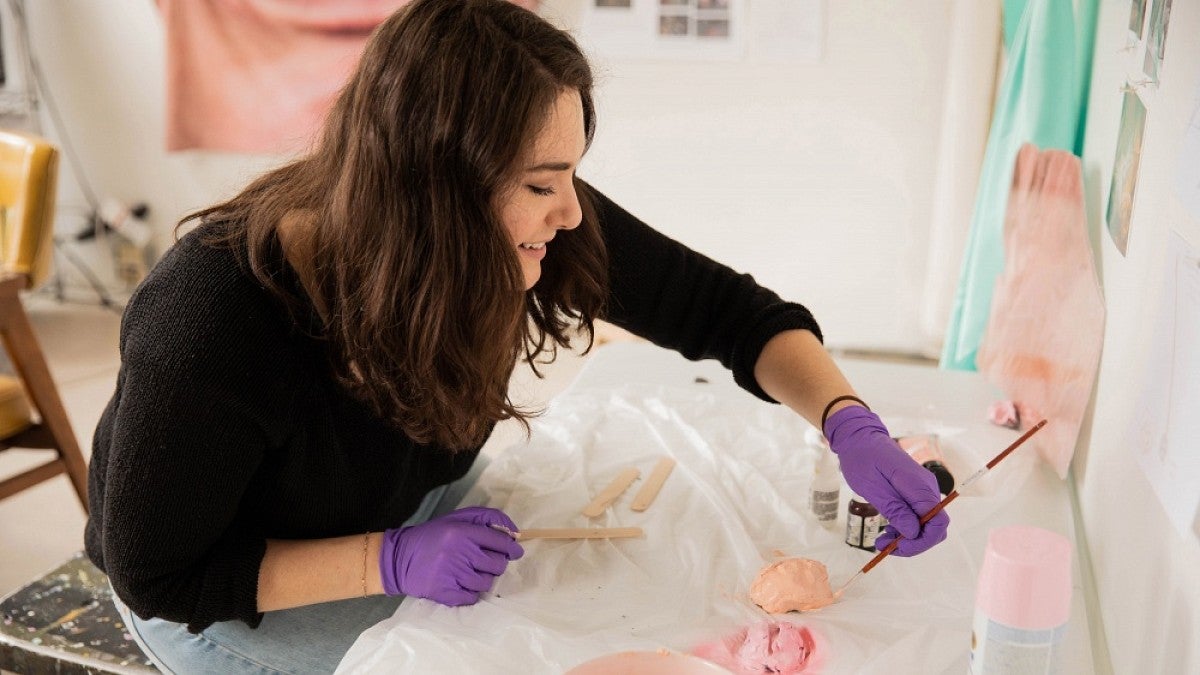Jeff Reingold’s major was art, but his business is property management — a career path he began as a UO sophomore in 1969.
“When I finished my first year in the dorms, it was time to move out and dad, bless his heart, didn’t want to pay my rent,” Reingold recalls. “He was pretty smart. He helped me buy a house on 20th and Onyx. It wasn’t that much, but he thankfully made the down payment. I rented out rooms and covered my rent. I wasn’t very good at math, but I could figure this math out.”
That first house led to another, then another. Jeff and his late wife, Francine — who earned her bachelor’s and master’s degrees from the UO’s College of Education — married while they were UO students and worked together to build a business from the ground up. But Jeff Reingold also continued studying art, especially printmaking.
“Had I known how to make a living in art, there’s a possibility I may have been able to do it,” he says.
Today Reingold hopes that a philanthropic gift from Francine and him will help graduates from the College of Design make a living as artists by teaching them how the business side works.
“Many fine artists graduate without the ability to make a living as a practicing artist,” Reingold says. “For people who are that good, it would be nice for them to be able to practice their art in a way that’s fulfilling in emotional terms and also makes it economically rewarding enough to allow them to do the work.”
Now in its second year, the Reingolds’ initiative gives College of Design students practical lessons from practicing professionals. Students tour galleries, meet with artists and curators, and attend workshops on the nuts, bolts, dollars and cents of the art world.
For Master of Fine Arts candidate Aja Segapeli, a visit from Portland curator Ashley Stull Meyers was invaluable.
“It was great to be able to ask questions about this strange protocol that is not often discussed,” Segapeli says. “How do you invite curators and gallery owners to your show? How do you gain traction and visibility as an emerging artist? I thought it would be a very stuffy process and involve writing lots of letters. It’s actually less formal and more about social media and networking. But there’s still an etiquette to it, and it was very helpful to learn about that.”
During a series of panel discussions in Portland this June, graduate students had more opportunities to hear from art professionals. The panels covered topics such as public arts, how to launch new initiatives and tips on how to sustain a business or practice.
“The most valuable insight from our professional practices workshop was having a diverse panel that represented a cross section of the Portland art scene,” says Aaron Bjork, a graduate student focusing on digital arts. “The candid conversations between artists, curators and collectors shed light on the ecosystem in a way that couldn’t be learned in a book. A common theme that organically emerged throughout the day was the importance of surrounding yourself with good people and a term which someone called ‘relationship economy.’
“The panelists also gave interesting stories about the struggles they faced after graduate school, which was great advice for the group of us MFA candidates who will be out of school in the near future. This group in particular had faced ups and downs, yet emerged in a respectable place in their careers, which was very encouraging.”
In the fall, the college will offer a workshop entitled “Financial Literacy for Artists, a Crash Course in the Essentials of Finance.” Those are the kinds of important topics and practical advice, Reingold says, that many aspiring artists miss in college, because most of their time, naturally, is focused on creating art.
“To not understand any aspect of running a business — and to go out and try to make a living — is a pretty tough thing to do,” he says. “I always wanted to have a class named ‘The Business of Art.’ Or ‘The Art of Business.’”
As a UO undergraduate, Reingold worked extensively with friend and mentor LaVerne Krause, a faculty member who, as the only woman in the Department of Fine and Applied Arts, founded the UO’s printmaking program. A gallery that showcases new student work weekly in Lawrence Hall is named in her honor. Reingold’s work included making silk-screen posters for Erb Memorial Union events, including one for a Jimi Hendrix concert.
But an art career wasn’t in the cards for Reingold. Neither was the family business; his great grandfather started Portland landmark Reingold’s Jewelers in the early 1900s. He and Francine continued with the rental properties, and he founded Income Property Management Co. in 1974. Today he’s president of the company, which has offices in Portland and Eugene.
The Reingolds have also given generously to the Charles H. Lundquist College of Business, UO Libraries and other areas of campus. For Reingold, this recent gift to the College of Design is a way to support creative pursuits that society too often dismisses as superfluous.
“In the world we live in,” he says, “art is more essential than ever.”
—By Ed Dorsch, University Communications


